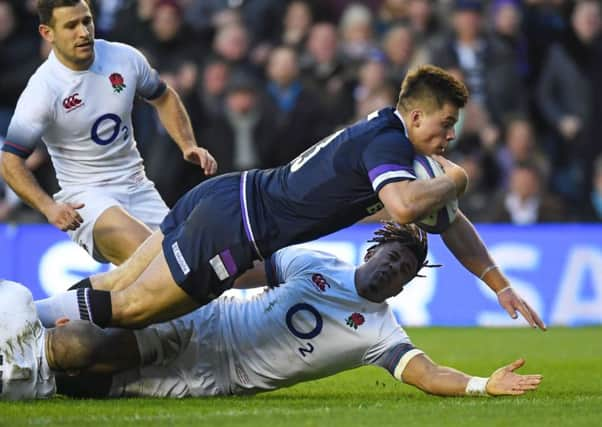Allan Massie: Ambition and panache key to Scotland victory


It deserved praise of course. The first half was as good a half as we have had since the Five Nations became Six; as exhilarating at our last Five Nations match in Paris in 1999, when, as seems appropriate now, Gregor Townsend himself scored one of our five first-half tries. Even though Saturday’s match was at BT Murrayfield, few of us outside the Scotland camp expected to win; at best, we thought, if everything went our way, we might just. This was quite reasonable. England had lost only one match in the tournament since Jones took over as coach after the 2015 World Cup, and few thought that their No 2 world ranking flattered them. So the ambition and panache with which we played in that first half were all the more delightful. Whatever fans may have thought, Scotland played in a manner which suggested they were confident they could, and would, win; and this was remarkable.
The backs – the piano-players – scored the tries, but it was the piano-shifters up front who made the win possible. They outplayed the England pack all over the field. Some of the English forwards were short of their best. The young and usually formidable Maro Itoje looks as if he may not have fully recovered from his exertions on the Lions tour. I’ve read that Dan Cole never touched the ball on Saturday – I’ve always thought him an old-style prop, but not that old-fashioned. But everyone in the Scotland pack contributed; Dan McFarland is doing a great job as forwards coach.
Advertisement
Hide AdAdvertisement
Hide AdNigel Owens should be on lots of Scottish Christmas card lists this year, not because he correctly disallowed two runaway English “tries”; any international referee would surely have done that. No, it was for his refereeing of the breakdown that we should be grateful. He permitted a genuine contest there, and, unlike some of his colleagues, he doesn’t subscribe to the view that the side carrying the ball into the tackle deserves to retain it. There’s no logical reason why they should, good reason why the tackler should be rewarded if the tackled player fails to place the ball cleverly. Mr Owens permitted a contest and the game was the better for it because a succession of phases as a result of there being no such contest makes for tedious rugby.
Scotland scored one try against Wales, two tries against France and three against England. Remarkably all were scored by backs – when did that last happen? Equally remarkably, neither Stuart Hogg nor Tommy Seymour, the two leading try-scorers in this team, has crossed the line. Neither often goes three games without scoring a try: Dublin beckons. Meanwhile Huw Jones’ try tally mounts. On present form he must be the best outside centre in the tournament, his ability to run a line that wrong-foots defenders being very evident in his second try on Saturday, when neither Anthony Watson nor Mike Brown could quite get near enough to effect a tackle. Opponents will be wary of Jones now, so wary that opportunities for others will appear.
After the France match some of the more intemperate Scottish fans were calling for Finn Russell to be dropped. There was never any chance of that happening, and I daresay some of those who abused him a fortnight ago are now singing his praises. If Scotland’s matches against Wales and France seemed to some to justify Warren Gatland’s refusal to pick him for the Lions, Saturday suggested Gatland got it wrong. All Russell’s wide array of skills was on display in a joyous performance – which, by the way, included a dozen tackles. But nothing was more impressive than his courage and self-belief in throwing out that absurdly audacious pass over Jonathan Joseph’s head and into Huw Jones’ arms. He might have played safe, with a long, diagonal kick deep into the English half, and nobody would have blamed him; indeed his judgment and percentage play might have been applauded. But he trusted his own reading of the moment and his skill. Given the questions – and abuse – directed at him in the days before the match, it was wonderful to see.
And so to Dublin – always assuming this so-called Siberian winter has taken a step back. Meanwhile we may reflect on the fact that Ireland haven’t lost a Six Nations match at home for years.